A Conversation With Andris Gauja (FAMILY INSTINCT)
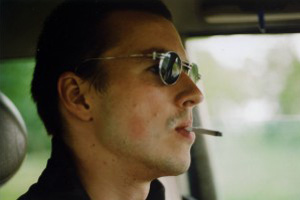 Andris Gauja, director of the documentary Family Instinct—a disturbing, insightful observation of f**ked up humanity in rural Latvia— stands and sits with perfect posture, exuding confidence and enthusiasm. The son of a classical violinist father and a scholarly mother, he studied screenwriting before moving into producing human interest stories for TV news. Eventually he became frustrated with TV, wanting to go deeper into his stories.
Andris Gauja, director of the documentary Family Instinct—a disturbing, insightful observation of f**ked up humanity in rural Latvia— stands and sits with perfect posture, exuding confidence and enthusiasm. The son of a classical violinist father and a scholarly mother, he studied screenwriting before moving into producing human interest stories for TV news. Eventually he became frustrated with TV, wanting to go deeper into his stories.
His voice is somewhat musical, and he engages you with a rare combination of directness, intelligence, and sensitivity as he overflows with ideas about film and reflections on the making of Family Instinct. He has a nice habit of slowing down from time to time just in case you want to jump in, and a boyish fascination for the world around him and all that he’s discovered. His film is getting a lot of attention and praise on its international festival run, but he’s clearly bruised by accusations, in his native Latvia, of exploiting his subjects. We grab a black metal bench in the shiny, terrazzo-and-glass hallway of the massive Regal Cinemas multiplex in downtown L.A., just before his Q&A for the Los Angeles Film Festival screening of Family Instinct.
Hammer to Nail: How did you get to know the people in Family Instinct?
Andris Gauja: I worked on a TV program which was presenting itself like an alternative news, and we made a lot of, you know, portraits about people, and at that time we knew about this legal issue that local institutions didn’t really know how to cope with—a brother and a sister and they have two children together. There’s nothing clearly stated in our law—in Germany for instance if people would find out about a brother and sister having an intimate relationship they would immediately prosecute them. In Latvia, it’s just stated that you cannot marry each other if you are blood relatives, and there’s nothing said about incest as such. Now some politicians are using this film to discuss that we should change our law, but I think it’s nothing more than PR. I just knew about this case, I didn’t know anything more about them, and actually it took approximately eight years until I made this film. And this is interesting because I was somehow a little bit thinking about them all the time. The institutions didn’t do anything to cope with this case, but then I found out that at one point they started to change their minds, in a way they started to prosecute them, they started to turn against them, to act against them, to split them. And that was really interesting from my point of view, because society had accepted something, and afterwards realized that it was a big big error, and this paradox is the core of this idea: let’s make a film.
H2N: So tell me about shooting some of these scenes—for example the scene where I don’t know if it was a kitten or a puppy gets mauled while you were shooting?
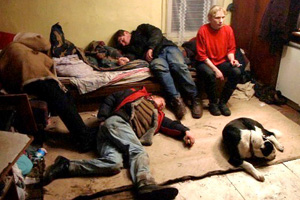 AG: Actually that’s a kitten, but they’re so drunk that they don’t actually—there’s no difference for them, a kitten or a puppy. That was shot by my cameraman, Alexanders, and there was complete chaos during the party, Zanda’s birthday party, during the summer—they were drinking lots and lots of alcohol, and it was, you know, very difficult to focus on anything that night. I was talking to some of them, trying to somehow organize them; Alexanders went inside, he didn’t know what to shoot, he saw that there was complete madness going on and he just shot what was going on, and the dog came in and was trying to eat the kitten and the cameraman didn’t know what to do. There were many cases when we just didn’t know what to do. It was really difficult to cope with this chaos.
AG: Actually that’s a kitten, but they’re so drunk that they don’t actually—there’s no difference for them, a kitten or a puppy. That was shot by my cameraman, Alexanders, and there was complete chaos during the party, Zanda’s birthday party, during the summer—they were drinking lots and lots of alcohol, and it was, you know, very difficult to focus on anything that night. I was talking to some of them, trying to somehow organize them; Alexanders went inside, he didn’t know what to shoot, he saw that there was complete madness going on and he just shot what was going on, and the dog came in and was trying to eat the kitten and the cameraman didn’t know what to do. There were many cases when we just didn’t know what to do. It was really difficult to cope with this chaos.
H2N: It seemed like in some of the scenes you were just capturing stuff, and some of the scenes were staged, or re-created—how did that work?
AG: I would say that there are two opposite parts of this whole process. From one point of view there’s this—I would say chaos, because life is a chaos in my opinion, and on the other hand there’s my screenwriter’s background—for me the story is everything, and we did everything to organize the story, to structure it, to have the focus on the main paradox, and the focus on the main protagonist; to have this one-year structure, and whenever we felt there was a hole in the story we tried to fill it with the necessary things, and one thing which is very important is the dialog, because without these dialog scenes, dialog episodes, I don’t think the viewer could actually read the story. So we started to construct these dialogs, and the characters actually started to feel good about it, actually they started to like to play out their lives. They became almost like actors, but anyway, everything they did was based on their experience, on their lives. So I will say that everything is for real, and at the same time parts of the story could be described as a narrative film methods.
H2N: So for example the scene where John and Andulis are dancing naked together, and John is covered in red paint, and they end up sleeping together, did that come from your imagination?
AG: So we talked to John and there had been several situations where he had pretended to commit suicide, and he had really cut his veins; he had shown a rope which he would use to hang himself, and somehow an idea appeared—we asked him actually what could he do to conquer Zanda’s heart, because he really loved her, that’s what he said, and then there was this idea that he could paint himself with red paint, and do the same thing again, but actually now I feel sorry about this shot, because I feel sorry about the kids, because we were so focused on the story, on the shots, on the scenes, that sometimes we forgot to think from the children’s point of view, and now I feel a little bit uneasy, it’s difficult for me to watch the shot because the girl is really—she feels endangered, I think. She looks frightened when he comes in. It’s complicated. There were lots of those ethical issues where we had to choose… probably some moments I feel… you know, it’s a tricky thing—what is more important, the film or the people? Of course it’s the people…
H2N: Ingmar Bergman once said it’s the film…
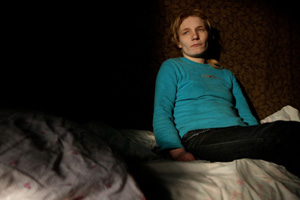 AG: Probably yes, and I must say that during the filming process I really thought more about the film and yeah sometimes it’s hard to say it, but that’s true. After the film I must say that probably my efforts to help Zanda and her family—because I really got involved in her life after the film—probably that’s a way for me to, you know, pay my debts to her? Something like that. In the second scene, the gay scene, both guys, both brothers, are lying naked on the bed—that was a complicated issue as well because they were really drunk, but a lot of these characters were drunk during the shooting of the film, and my approach was that I wanted to show their story. If their story is really full of alcohol, then we shouldn’t pretend that it’s not like that. So at the end of this evening when the two brothers played with themselves, was it despair? I don’t even know what term you could use for it. Not a disease, but a complex or something like that. It’s very complicated. For me it’s still a mystery. We knew that they were—we were told that they were having a kind of relationship.
AG: Probably yes, and I must say that during the filming process I really thought more about the film and yeah sometimes it’s hard to say it, but that’s true. After the film I must say that probably my efforts to help Zanda and her family—because I really got involved in her life after the film—probably that’s a way for me to, you know, pay my debts to her? Something like that. In the second scene, the gay scene, both guys, both brothers, are lying naked on the bed—that was a complicated issue as well because they were really drunk, but a lot of these characters were drunk during the shooting of the film, and my approach was that I wanted to show their story. If their story is really full of alcohol, then we shouldn’t pretend that it’s not like that. So at the end of this evening when the two brothers played with themselves, was it despair? I don’t even know what term you could use for it. Not a disease, but a complex or something like that. It’s very complicated. For me it’s still a mystery. We knew that they were—we were told that they were having a kind of relationship.
H2N: What about when Valdis gets out of jail, the coming home scene? What was it like to shoot that, and not be involved with him walking home through the snow?
AG: I’ll try to say it in a concise way because that’s a long story, but it was very, very, very difficult, it was really complicated, because while Valdis was in jail he became totally disappointed about the whole filming process, because we started to shoot while he wasn’t in jail, but when he was put in jail the only communication with him was mail, and in his letters he wrote to me and to Zanda that he didn’t like this idea of filming anymore, but it was too late—of course we had started to shoot, and we had to continue. And he didn’t say that he prohibited us from going on with the shooting, but he expressed his attitude that he didn’t like this idea anymore, and I needed this year, of the plot, and I needed him to come back at the end of the film, because that’s the structure of the story—the whole year. He’s put into jail; her life without him; her choices; her possible escape from the whole situation and his coming back—that’s the structure of the story, and I needed the final episode, so the only thing that I could imagine was to write to him that I could help him, to transport him back from the prison to his home. Yeah, it was a kind of a manipulation. I could say it to him, to his face, as well. It was a compromise—better to say it was a compromise. I wrote to him that I would help him to go back to his home, and I asked him please to let us just film some shots and that’s all. That could be its own movie, us transporting him back home, because we didn’t have any footage of him in this jail, in his prison cell, and I really felt that I had to have some shots with him in the cell. We have those shots in the beginning of the film and they are very important. Then we started to talk to him, and I had organized an abandoned prison, where we could film him in his cell, so that’s a fiction already [laughs], that’s a fiction part of the film. And then we started to talk to him, “Please explain to us what your prison cell was like,” and it was amazing how he really wanted to explain, to tell us about this, you know, forbidden territory. And then I asked him, “Valdis, we cannot understand anything about this prison, we have never been to prison, so could we just go to a prison cell and you could show us how life was there?” It was really complicated, but somehow, I don’t even know how, we ended up in a prison cell and we got those very important shots with him. Then it was very complicated to have the shots where he’s walking, because after the prison he said “It’s over, the shooting is over,” and, we had to do anything not to be able to drive him home that day; we had to drink with him, and somehow in the end we had those shots. The most mysterious thing for me is the last shot of the film, which is really important to this film I guess, because it makes the whole film more universal than just a social situation or so, it’s much more philosophical, when he’s playing with his dog, and when he’s going away, and she’s sitting there alone for a long, long time. And this was actually the last shot during the whole filming process, because Valdis became really angry, and he said “Guys—I already told it to you that the shooting is over. Get away from this house.” And I asked him, “But Valdis, could we just have some more shots, because the film is not finished, really,” and he said, “Guys, you have five minutes from now.” And what we have is really the last minutes of our shooting before we had to leave. That’s a paradox. I think sometimes it’s really important for a filmmaker to have all these obstructions to make a shot that is full of meaning. You have to be on the edge of this situation—on the edge.
H2N: Valdis seemed incredibly angry when he was in jail, when you hear his letters—I got the impression that he really was romantically and passionately in love with his sister and felt betrayed by her.
AG: I wouldn’t say he was romantically passionate about his sister; I would strike through the first word. That is the strange thing about their relations; I think there has never been any romance, but there has been a strange kind of passion. It’s something I’m sure about; it’s very complicated. I’ve heard, I’ve read about, psychologists, they have a term like… genetic magnetism? The power that is like magnetic…
H2N: Genetic attraction?
AG: Genetic attraction! You should check it out, or I could send you this term.
H2N: Like siblings that are separated at birth, and when they see each other they…
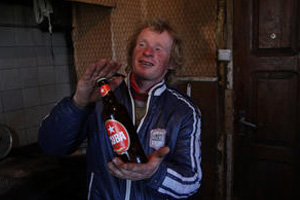 AG: Exactly! Exactly! But they have to be separated in order to be attracted to each other. That’s a strange thing, and this is Valdis and Zanda’s case, because they were separated from their mother. Actually their mother had ten children and all of them were taken away, because she was an alcoholic, and the father too, so they were put into the socialistic boarding schools, as part of the Soviet social system. So they saw each other for the first time when they were sexually adults. I think it’s very important that for them, this fact that they were brother and sister was just a fact, that didn’t have any emotional content. It was just a word with no meaning and that’s very important. The funny thing is that for me it’s not a film about incest, and it’s not a film about social issues, it’s not a film about the conflict between marginal society and upper society, or anything that could be described. For me it’s a kind of a meditation about the nature of the human being, because I can actually really understand each of those characters. Because actually every character in this film—it’s a very interesting thing—all of them are products of those boarding schools—Andulis, John, Oscars, all of them. All of them had been separated from their families, during Soviet time, so this is really interesting, they spent their childhood in boarding schools, obviously with a deficit situation—a deficit of love. It’s so important, and in the kitchen scene with the mother, when we realize that the mother doesn’t love her children, that’s the whole point. For me, the film, the whole situation is really understandable, I can understand the reason, the cause of the whole situation, why they are how they are, and that tells me that it’s actually not a film about them, it’s a film about us, or it’s a film about me and I can identify with those people.
AG: Exactly! Exactly! But they have to be separated in order to be attracted to each other. That’s a strange thing, and this is Valdis and Zanda’s case, because they were separated from their mother. Actually their mother had ten children and all of them were taken away, because she was an alcoholic, and the father too, so they were put into the socialistic boarding schools, as part of the Soviet social system. So they saw each other for the first time when they were sexually adults. I think it’s very important that for them, this fact that they were brother and sister was just a fact, that didn’t have any emotional content. It was just a word with no meaning and that’s very important. The funny thing is that for me it’s not a film about incest, and it’s not a film about social issues, it’s not a film about the conflict between marginal society and upper society, or anything that could be described. For me it’s a kind of a meditation about the nature of the human being, because I can actually really understand each of those characters. Because actually every character in this film—it’s a very interesting thing—all of them are products of those boarding schools—Andulis, John, Oscars, all of them. All of them had been separated from their families, during Soviet time, so this is really interesting, they spent their childhood in boarding schools, obviously with a deficit situation—a deficit of love. It’s so important, and in the kitchen scene with the mother, when we realize that the mother doesn’t love her children, that’s the whole point. For me, the film, the whole situation is really understandable, I can understand the reason, the cause of the whole situation, why they are how they are, and that tells me that it’s actually not a film about them, it’s a film about us, or it’s a film about me and I can identify with those people.
H2N: How can you identify with them?
AG: Well it might sound strange, but for me the whole setting of this film is just a setting: their circumstances, the way they live, their poverty, and everything—it’s just the setting, because they’re not guilty of, like, being born there, being born by their parents—they couldn’t have been different. For me it’s like, I can realize that they are just as they are. And that does mean that their reactions are normal, and understandable, just because they have never had any other experience, because that’s their experience, and that does mean that it’s probably very important for a filmmaker not to look at his characters from somewhere above, but to feel empathy, to feel compassion for those characters—I think it’s one of the most, most, most important things in the whole process. So I can totally say that I do not look on them from somewhere above. I try, I do everything to look, to be on the same level of… empathy.
H2N: That comes across in the film. And just to go back to the scene with the mother—how did that scene come about, that they were with the mother? Or did the mother live with them?
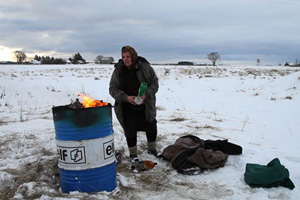 AG: The mother lived in another corner of the house, so there was really a chaos in this house. Valdis, Zanda, and the two children lived in one corner, in two rooms. They lived there as a family, an incest family in one corner of this house, and the mother lived in another corner of this house, with her, like, boyfriend, and his two sons, John and Andulis, lived in the third part to this house, so it’s very complicated, very difficult.
AG: The mother lived in another corner of the house, so there was really a chaos in this house. Valdis, Zanda, and the two children lived in one corner, in two rooms. They lived there as a family, an incest family in one corner of this house, and the mother lived in another corner of this house, with her, like, boyfriend, and his two sons, John and Andulis, lived in the third part to this house, so it’s very complicated, very difficult.
H2N: Is Zanda still with Andulis?
AG: Zanda is still with Andulis and both children and they really live in another village. So they have, probably people would say, a strange model of family, because Andulis is not a boyfriend, I’m totally sure about it, but he’s almost like Dostoevsky’s Idiot, something like that, he’s totally devoted to her and he could do anything for Zanda for all of his life, I’m sure about it. Even knowing that Zanda doesn’t consider him like a real man to be together with. So this is very strange. Andulis is a very very interesting character because despite all the violence, alcoholism, everything, the madness going on around him, he’s the only person, the only character, that is completely non-violent. I couldn’t imagine him never ever hitting a person or even saying something bad, really bad to other people—it’s really strange.
H2N: How does your film fit into the social and political situation in Latvia right now?
AG: Many people are really angry at me, because they really don’t want to accept the fact that there are a lot of such people all over the country. The film doesn’t show Latvia, that’s for sure, but it shows what’s going on in quite a lot of places all over Latvia. Alcoholism and violence, especially alcoholism, is a huge problem in Latvia.
H2N: What are those two-liter bottles of beer we see in the film?
AG: Yeah they’re mostly drinking, like, very strong beer—those are two liters, and they mostly drink like seven percent alcohol beer, and they also drink homemade vodka—that’s something we can see in this crazy insane party during the summer, but that’s a huge problem in Latvia, and it has become a problem since the Soviet occupation. As far as I know Latvians didn’t drink much before the Soviet occupation. It’s a really huge problem; they don’t want to accept it because it’s very uncomfortable—it’s something we would like to, you know, put under our cover.
H2N: It seems like their solution was to move Zanda to this cold, boxy apartment.
AG: We have lots of those social workers all over Latvia, that’s part of the social system right now, it’s not the worst one because it’s probably much better than it was in Soviet times when it was just bureaucrats, but even now the system really doesn’t work—the social workers try to be in contact with all the unemployed people and so on so on so on, but we can see from this film there is actually no dialog between them. Both sides look like aliens to each other. They should be taught how to communicate—I think that’s also a legacy of the Soviet system, because people used to be so—that was a total bureaucracy, you had to follow the instructions, but you can’t create a dialog with people if you just follow instructions on how you should talk to them. And that’s the answer why I got this amount of access to the characters—because we had a dialog between us—we still have. I can even talk to Valdis despite all the things we’ve done and despite that we helped Zanda to move and he was totally angry about it, but the interesting thing about all these characters is they don’t have any rules or any masks—they are very natural. They can be cruel, violent, bad attitude toward each other, but they are at the same time really true or sincere—no matter what they are they are sincere. That means that we can actually talk to them, that Valdis is not going to kill me. He saw the movie and he said that as a filmmaker you have done your work, you’ve probably done your work pretty well. I was very surprised, because I was doing everything not to show the film to Valdis. I showed it to every character in the film, they were on stage during the premiere, we had the premiere in Riga—it was very important for me, because all those people in Latvia had accused me, that I am a very bad person, that I had manipulated them, used them, just to create a movie, just to become a star. And my answer was to have the premiere not in IDFA Amsterdam, but in Riga, Latvia, and just to have them on stage, and have their words, and they said okay, more or less. They didn’t say anything bad about what I’ve done—it was so important. But I was trying to delay Valdis watching this film because I was afraid that he could actually—not necessarily kill me, but, as we see in the movie Oscars becoming attracted to Zanda, and John and Andulis, three guys living in the same house, or the same village who are attracted to Zanda, I thought that Valdis could hit or kill them. But he saw the film, it was like half a year after the premiere, and I think he had calmed down after the whole shooting process, and he called me and he said he was fine with the film. It’s so strange. And he didn’t do anything to John or to Andulis or to Oscars. These people are probably much worse from some point of view than normal society, but on the other hand they are much better than normal society because they’re very natural and sincere.
H2N: There’s been this whole wave of documentaries now that incorporate staged scenes and raw documentary, cinema verité, combining those two together, and I’m curious what your take is on that—do you have lines that you don’t cross, or do you make it up as you go along—as a documentarian what do you think the rules are?
AG: I think there will be further movement in that direction, I think the line between documentary and fiction will blur more and more, that’s my opinion. I think that documentary filmmakers have realized that probably being very polite and neutrally observing the reality with their camera—that’s kind of an illusion, because if you are in a room with some people and a camera and you’re all pretending there’s no camera—we already hear this word: “pretending,” so that I think there’s a certain amount of illusion in the cinema verité or direct cinema approach. At the same time the fiction guys have realized it’s impossible to create, to re-create the reality; they cannot reach a certain amount of the truth. It’s nothing new that in fiction film there could be documentary elements, I think that’s a very normal thing—new wave directors have done it lots and lots of times—probably a bigger surprise for people is that documentary has something to do with fiction. I think it’s just a normal trend. For me personally it’s not so important to have these borders, for me it’s important why should we make movies in general, what could I—what input could be mine, what input in this filmmaking world, and the only reason to continue doing it actually for me personally is I think I’ve found a method for myself, and the method is a combination of two things: one is like the clarity, the distance, with your attitude about the story you must have this distance which is no longer and no shorter than a certain amount. If you read a newspaper or a book there’s a certain distance you must have. Each of us, we have a very precise distance from our eyes to the story that we must have. The filmmaker should find this distance, because he is reading the book of reality, and he has to capture the reality. That’s one thing, and the other thing is that I or we, we have to develop the empathy or understanding of human being, we have to love human being, to understand human being, as much as possible, and I don’t think there is any director or screenwriter in the world who could say that he has understood what human being is like. I think we must study what is the nature of human being. And I think that directing has a lot to do with what the Eastern world calls meditating, because meditation, if it’s a real, sincere meditation, has to do with both of the same things. You have to be very stable and very calm, in order to listen, to understand, to be aware of what’s going on, and at the same time, when you reach the certain level—it’s also a distance to the reality—then you start to realize that you can understand the reality more. And you can understand people’s nature more and more, you can understand yourself and the people around you and you can become more compassionate, have more empathy and understanding. That’s interesting for me, that’s a thought I discovered in the summer of doing Family Instinct and trying to find the reason for making this film. Because sometimes when we shot the film I was thinking why am I doing this, because there was a certain amount of insanity, madness going on and sometimes I had to think about the reason, and I have found the reason actually. Family Instinct, like many other movies, is about the nature of the human being. Probably it’s a little more exaggerated story or the emotions are more colorful than we’re used to. So I think the clarity and the distance at one point of view, and the being into everything—that’s the paradox I personally should follow.
[Gauja’s next project is Graduation Day, about a schoolteacher whose marriage falls apart and ends up having an affair with one of her students. It will be a narrative with a parallel documentary storyline.]
— Paul Sbrizzi









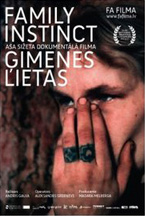


Gordon Shute
Thanks for this very frank and valuable insight into the film and the director. Empathy, with a necessary yet uncertain distance–to articulately capture this daunting ambiguity is the heart of storyelling. Stick to the facts while knowing that a fable really is trying to tell you the truth.